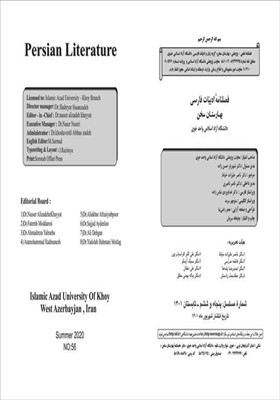Analysis of the Story " Shahr-e Sangestan " from Akhawan Sales with Formalistic Approach ( Based on Defamiliarization and Accentuation )
Subject Areas : Abstract Articles
1 - Department of Persian Language and Literature, Marand Branch, Islamic Azad University, Marand, Iran.
Keywords: Formalism, defamiliarization, accentuation, Akhawan poetry,
Abstract :
Formalism was the first stream of thought which emphasized on literary capability of language in creating new meanings and set the literary text itself as the base of research. In this way, the intention of the author and the historical and philosophical background are excluded from the sphere of criticism and studying. Formalists paid attention to the literary details, body and appearance of the literary works. There has been much struggle, in the contemporary period of time, especially after Nima, to find new spaces for creativity and innovation in the lingual domain. To deviate from the norms, the contemporary poets, have experienced lots of ways in literature among them the defamiliarization of Akhawan has added specific accentuation to his poetry.Mahdi Akhawan Sales, is of the poets after Nima who has added new capability to the domain of Persian language. The aim of this research is to study the structure of the poetry " The stories of the Sangestan City " on the formalistic approach based on defamiliarization and accentuation. The results of the study show that Akhawan, in selecting and setting of the words and artistic induction of the words, by utilizing the external concreteness beside the ancient old words in the form of poetry, has endowed special accentuation to it. In this paper, we study the key implication of the word formalism and its story first, and later analyze it through the theory of formalism.
الف- کتابنامه
1- احمدی، بابک، (1391)، ساختار و تأویل متن، تهران: نشر مرکز.
2- اخوان ثالث، مهدی، (1394)، از این اوستا، تهران: نشر زمستان.
3- ایگلتون، تری، (1391)، پیش درآمدی بر نظرّیة ادبی، ترجمة عبّاس مخبر، تهران: نشر مرکز.
4- شایگان فر، حمیدرضا، (1380)، معرّفی مکاتب نقد (همراه با نقد و تحلیل شواهد و متونی از ادب فارسی)، تهران: دستان.
5- شفیعی کدکنی، محمّدرضا، (1391)، رستاخیز کلمات (درس گفتارهایی دربارة نظریّة ادبی صورتگران روس)، تهران: سخن.
6- شمیسا، سیروس، (1383)، نقد ادبی، تهران: فردوس.
7- قاسمیپور، قدرت، (1386)، نظریّههای ادبی1 (درآمدی بر فرمالیسم در ادبیّات)، اهواز: رسش.
8- معین، محمّد، (1387)، فرهنگ فارسی، تهران: فرهنگ نما.
9- مکاریک، ایرناریما، (1390)، دانشنامة نظریّههایادبی معاصر، ترجمة مهران مهاجر و محمّد نبوی، تهران: آگاه.
ب- مقالات:
1- روحانی، مسعود و عنایتی قادیکلایی، محمّد، (1388)، «بررسی هنجار گریزی در شعر شفیعی کدکنی»، پژوهشنامة زبان و ادب فارسی (گوهر گویا)، سال سوم، شمارة سوم، پیاپی 11، صص: 63-90.
2- صمصام، حمید، (1395)، «برجسته سازی در شعر اخوان»، فصلنامة تخصّصی زبان و ادبیّات فارسی، دانشگاه آزاد مشهد، شمارة 6، صص: 50-70.
3- صهبا، فروغ، (1384)، «کهن گرایی واژگانی در شعر اخوان»، فصلنامة پژوهش زبان و ادبیّات فارسی، شمارة پنجم، صص: 41-64.
4- طغیانی، اسحق و صادقیان، سمیّه، (1390)، «هنجار گریزی در مجموعه شعر از این اوستا»، ادب پارسی معاصر، سال اوّل، شمارة اوّل.
_||_
